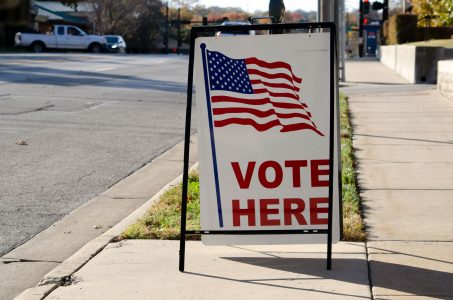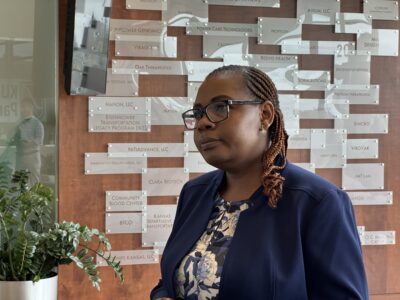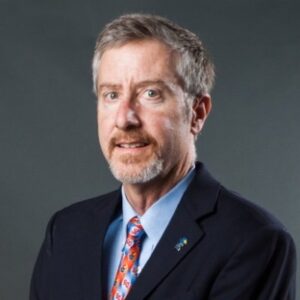Voters Guide: A look at candidates in primary races for U.S. Senate, Kansas governor, other statewide offices

photo by: Ashley Golledge
This 2020 sign at the Carnegie Building encourages Lawrence residents to vote.
U.S. SENATE
The U.S. Senate seat held by Republican Jerry Moran is up for election in 2022. Moran is seeking reelection and faces one opponent in the Republican primary. Meanwhile, six Democrats are seeking to become that party’s nominee, and ultimately to become the first Kansas Democrat to serve in the U.S. Senate since 1939.
Here’s a brief look at each candidate on the Aug. 2 primary ballot.
Democrats
Mike Andra, Wichita: Andra has not created a campaign website, and other information about his campaign has been limited.
Paul Buskirk, Lawrence: Buskirk is a senior associate athletics director at the University of Kansas, where he supervises the student-athlete support services division. That division helps student-athletes with everything from tutoring to career counseling services. On his campaign website, Buskirk highlights his work with youth and promises to provide a “voice to help those who have little or none themselves — our children.” On the campaign trail, Buskirk has expressed concern about the overturning of Roe v. Wade, and has said Congress will need to consider questions about child welfare in the wake of that decision.
Mark Holland, Kansas City: Holland is the former mayor of Kansas City, Kansas, and the Unified Government of Wyandotte County, where he also served as a commissioner before being elected mayor in 2013. Holland also is a pastor and has been the executive director of Mainstream UMC, a Johnson County-based organization that has worked to reorganize the governance structure of the United Methodist Church, including supporting the ordaining and marriage of LGBTQ people in the church. On his campaign website, Holland advocates for affordable health care for all and said there “have also been too many irresponsible conspiracy theories about this global pandemic and vaccines that risk setting our country back 100 years in public health and wellbeing.” On other issues, his website says that he would defend the right of women to make decisions about abortion, that there is no widespread fraud in the American voting system, and that America must “stop criminalizing social issues,” such as abortion, mental health, addiction and gender identity.
Robert Klingenberg, Salina: Klingenberg is a first generation Mexican-American, who identifies himself on his campaign website as a “working class leftist.” On his website, he says the middle class has suffered and “only by rebuilding a robust workers collective can we regain our freedom, and separate ourselves from this work or die lifestyle.” Issues that he supports, according to his campaign materials, include: Medicare for all; debt relief for all; the Green New Deal environmental proposals; living wages; codifying Roe v. Wade; and defending marriage equality.
Michael Soetaert, Alta Vista: Soetaert on his campaign website describes himself as an entrepreneur and a gay man who feels that “inspiring others is my life’s true mission,” and that his goal is to equip and empower “patriotic Americans” to become responsible citizens. Soetaert says on his website that he is a pro-life Democrat, explaining that he was adopted at birth, which informed his views on abortion.
Patrick Wiesner, Overland Park: Wiesner, a former Lawrence resident, has worked both as a tax attorney and an Army lawyer for the bulk of his career, he said in a campaign video. Issues that he supports, according to his campaign website, include: A ban on assault-style firearms “capable of mowing down advancing troops”; immigration reform that includes “special immigration facilities” in northern Mexico where people in America illegally can return to enter a program — costing about $4,000 per person — where they could work through the process of gaining U.S. citizenship; a drug enforcement policy that would give “our President authority to search for, kill, and destroy those individuals who pour drugs into our country;” an energy policy that puts an increased emphasis on nuclear energy and declares fossil fuels will be a major part of the U.S. energy mix for decades to come, while wind and solar will be secondary sources of power.
Republicans
Joan Farr, Derby: Farr has had various occupations including a stint as a traffic investigator with the Wichita Police Department in the 1980s, an employee for Boeing, a home construction contractor, and also formed a nonprofit organization called Association for Honest Attorneys, according to her website. Farr now is a “pre-litigation counselor” who aims to “help people resolve disputes before they turn into lawsuits according to the Bible,” according to her website. On her website, Farr said she is running for Senate — she has filed to run in both Kansas and Oklahoma, where she once had a business — “to help people file mass pro se lawsuits to end the pandemic, overhaul the legal system by passing a justice amendment, implement a ‘Get Out of Debt’ plan that helps bridge the gap between the rich and poor, remove innocent Americans from the terrorist watchlist, ensure that her father receives the Medal of Honor, and pay off a fraudulent $140,000 IRS debt that she doesn’t owe.”
Jerry Moran, Manhattan: Moran, who has a law degree from KU and once was a community banker, has been a U.S. senator since 2010 and previously was a U.S. congressman representing Kansas’ First Congressional District. Moran’s website says he worked with President Donald Trump to deliver “the strongest economy our nation has ever seen by reforming our tax code and eliminating burdensome regulations. They also worked together to fix our immigration system, build the wall, support our military and veterans, and put America first.” Issues that Moran supports, according to his website, include: opposition to any legislation that would allow for a “federal takeover of our elections;” opposition to any taxpayer dollars to fund abortion; immigration policy that builds a wall on the U.S.-Mexico border; supporting legislation to enhance Wichita’s position as the “Air Capital of the World”; opposing legislation that promotes “critical race theory”; and supporting efforts to hold China accountable for “its unfair trade practices and for spreading COVID-19 across the world.”
KANSAS GOVERNOR
Democrat Laura Kelly is seeking a second term as Kansas governor. She faces one opponent in the Democratic primary. Meanwhile, Kansas Attorney General Derek Schmidt is the frontrunner for the Republican nomination, but he first must win a primary election against one other Republican.
Here’s a brief look at each candidate on the Aug. 2 primary ballot.
Democrats
Richard Karnowski, Seneca: On his campaign website, Karnowski says he’s been a “professional political candidate since 1992.” His website lists the environment, education and health care as major campaign issues, but does not list any specific policies Karnowski supports on the subjects. A June report by KMZA radio in Seneca said Karnowski is formerly of Seneca but now resides in Pottawatomie County. The station reports that Karnowski operates a tax preparation office in Seneca. His running mate for lieutenant governor is Barry Franco of Seneca.
Laura Kelly, Topeka: Kelly is seeking her second term as governor. Prior to being elected governor, she served in the Kansas Senate and also was the executive director of the Kansas Recreation & Park Association. Kelly has said her campaign will focus on “funding our schools, funding our roads, growing our economy, bringing jobs into the state.” On her campaign website, Kelly touts that her first term has helped produce $8.6 billion in new business initiatives, has helped create or retain more than 41,000 jobs, and has helped fund 425 infrastructure projects, such as road and bridge repairs. Her running mate for lieutenant governor is David Toland of Iola, who also is the state secretary of commerce.
Republicans
Arlyn Briggs, Kincaid: Briggs has described himself as a conservative “who has the backbone to hold people accountable.” Various media outlets reported that Briggs was arrested in Anderson County in June for making a criminal threat against a law enforcement officer. Media reports have listed Briggs’ occupation as a farmer. His running mate for lieutenant governor is Lance Berland, also of Kincaid.
Derek Schmidt, Independence: Schmidt has been Kansas’ attorney general since 2010, winning election three times. Prior to serving as attorney general, Schmidt was a member of the Kansas Senate, including serving as Senate majority leader. On his campaign website, Schmidt touts that as attorney general he has “defended President Trump’s America First policies that grew jobs, promoted freedom and made our economy strong.” On his website he said planks of his campaign include strong support for “personal responsibility, individual freedoms, and the Constitution,” plus “protecting traditional values like religious freedom, the rule of law, life, freedom to speak openly, and the Second Amendment.” His running mate for lieutenant governor is Katie Sawyer of McPherson.
ATTORNEY GENERAL
Three Republicans are vying to replace Derek Schmidt, who is not seeking reelection due to his campaign for governor.
Kris Kobach, Lecompton: Kobach, an attorney and former constitutional law professor, is a former Kansas secretary of state. During his time in that office, he pushed voter ID policies, and he has also gained a national reputation for promoting new restrictions on illegal immigration. His campaign website lists issues of prosecuting voter fraud, creating a special litigation team to sue the federal government, and a plan to “restore pro-life laws.”
Tony Mattivi, Topeka: Mattivi was a federal prosecutor for more than 20 years, and retired as an assistant United States attorney for the District of Kansas. Among the issues he has touted on his campaign website are: fighting government overreach, defending the unborn, and filing lawsuits to force the federal government to undertake more enforcement of immigration laws.
Kellie Warren, Leawood: Warren, an attorney, is a member of the Kansas Senate and previously served in the Kansas House of Representatives. Her campaign website highlights policies to protect Second Amendment rights, limiting the overreach of government, defending laws that limit abortion, and protecting private property rights, among others.
There is no contested Democratic primary for attorney general. Chris Mann, of Lawrence, is the lone Democratic candidate.
SECRETARY OF STATE
Republican Scott Schwab, of Overland Park, is seeking a second term as secretary of state. He faces a Republican primary challenge from Mike Brown, also of Overland Park. Schwab is a former member of the Kansas House of Representatives. On his campaign website he has touted improvements he has made to election security in Kansas. Brown is a commercial construction contractor and former home builder in the Kansas City metro area. His campaign website touts him as a candidate who will “put election integrity first.” There is no contested Democratic primary for secretary of state. Jeanna Repass, of Overland Park, is the lone Democrat to file for the position.
STATE TREASURER
Two Republicans are vying to take on Lynn Rogers, the Democratic incumbent, in the November general election. Steven Johnson, of Assaria, is a member of the Kansas House of Representatives and previously developed software for the financial services firm Ameriprise, according to his campaign website. In the Legislature he has served as chair of the tax, pension and insurance committees. Caryn Tyson, of Parker, is a member of the Kansas Senate and previously served in the Kansas House of Representatives. On her campaign website, she lists experience as a software engineer, a project engineer and a rancher. She currently is a co-owner of her family’s Kansas ranch.







